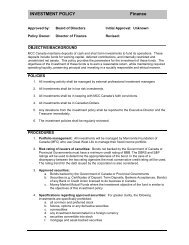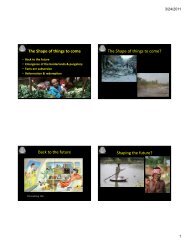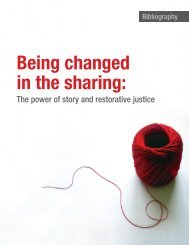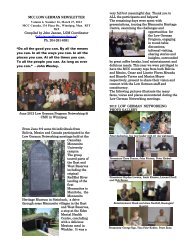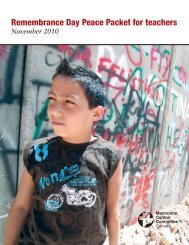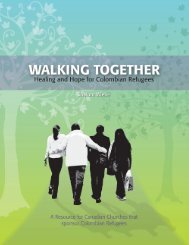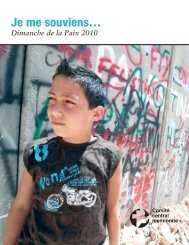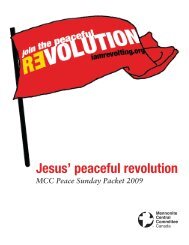to download PDF - Mennonite Central Committee Canada
to download PDF - Mennonite Central Committee Canada
to download PDF - Mennonite Central Committee Canada
Create successful ePaper yourself
Turn your PDF publications into a flip-book with our unique Google optimized e-Paper software.
inevitable, the last and often first resort in conflicts. If agod is what you turn <strong>to</strong> when all else fails, violence certainlyfunctions as a god. What people overlook, then,is the religious character of violence. It demands fromits devotees an absolute obedience-un<strong>to</strong>-death.”A full article can be found at www.biblesociety.org.uk/explora<strong>to</strong>ry/articles/wink99.docThe consumer cultureThe disease of consumerism has eaten deeply in<strong>to</strong> oursouls. The more we have the more we crave and themore we crave the more we have <strong>to</strong> make room for.These things are so precious <strong>to</strong> us that they have <strong>to</strong> beprotected and guaranteed <strong>to</strong> remain ours. This is onlyone step away from reasoning that is justified <strong>to</strong> havean army <strong>to</strong> protect what we have acquired. We begin <strong>to</strong>feel threatened by those who have less. The desire forsecurity takes over. Then it is easy <strong>to</strong> let go of theGospel of peace for the sake of security.—Siegfried Bartel, The Challenge of Living withConviction, Alternative Service for PeaceThe language of warAs a peacemaker, I’ve begun <strong>to</strong> notice how the languageof war is interwoven in<strong>to</strong> everyday conversation.We declare endless wars—on drugs, poverty, corruption,crime, rust.We shoot down ideas, attack a problem. We search formore ammunition for the argument or talk of magicbullets.We combat illness and launch endless campaigns andcrusades for the issues what we believe in.Making PeaceA voice from the dark called out,“The poets must give usimagination of peace, <strong>to</strong> oust the intense, familiarimagination of disaster. Peace, not onlythe absence of war.”But peace, like a poem,Is not there ahead of itself,can’t be imagined before it is made,can’t be known exceptin the words of its making,grammar of justice,syntax of mutual aid.A feeling <strong>to</strong>wards it,dimly sensing a rhythm, is all we haveuntil we begin <strong>to</strong> utter its metaphors,learning them as we speak.A line of peace might appearif we restructured the sentence our lives are making,revoked its reaffirmation of profit and power,questioned our needs, allowedlong pauses…A cadence of peace might balance its weigh<strong>to</strong>n that different fulcrum; peace, a presence,an energy field more intense than war,might pulse then,stanza by stanza in<strong>to</strong> the world,each act of livingone of its words, each worda vibration of light – facetsof the forming crystal.Denise Lever<strong>to</strong>v, Women on WarWhen our teenagers fail at something, they say thatit bombed. We are urged <strong>to</strong> arm ourselves againstignorance, insurance fraud, termites…We aim our sights higher. We fight for justice. We speak of being in the trenches or doingbattle with our kids. We charge in<strong>to</strong> a situation, ideally armed with the facts. When thatgoes badly, we take the flak for it.What does it mean <strong>to</strong> live among the metaphors of war?Does language move us <strong>to</strong>ward becoming a sponge, soaking up the violence of society? Ifit does, then our words will surely contribute <strong>to</strong> lack of shalom.We know that Jesus was surrounded by heavily armed occupation forces. Yet his languagedidn’t take on the warlike imagery of his times.Digging Deeper28



